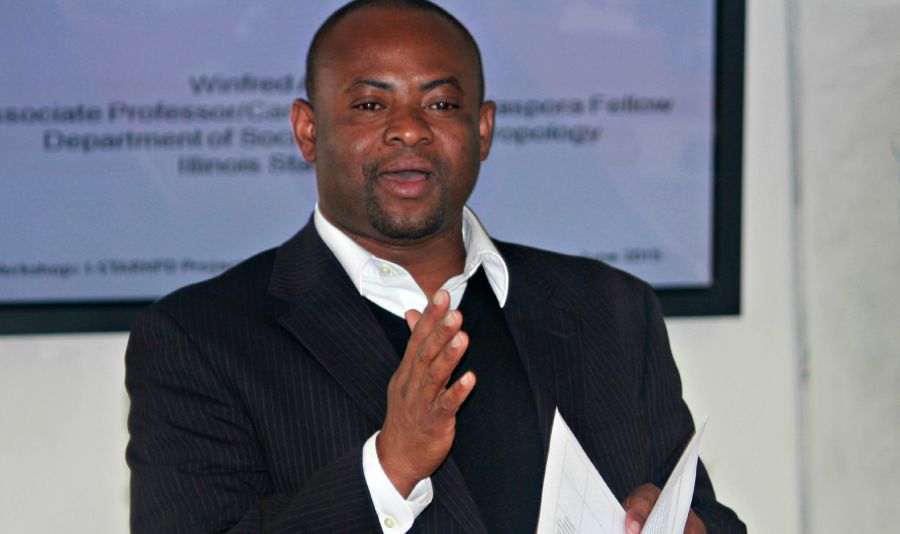Winfred Avogo spent his summer inspiring graduate students in South Africa, and gaining valuable insights to enhance his teaching and research at Illinois State.
Avogo, an associate professor in the Department of Sociology and Anthropology, studies demography, sexual and reproductive health, HIV/AIDS, and forced migration, among other issues. He spent his summer as a visiting scholar in the Department of Demography and Population Studies at the University of Witwatersrand in Johannesburg.
The residency was part of a one-year Carnegie African Diaspora Fellowship, offered by the Institute of International Education and sponsored by Carnegie Corporation of New York. During his time at the University of Witwatersrand, Avogo mentored graduate students, organized workshops on developing research proposals and writing scientific publications, and assisted with curriculum development. Research he conducted there is contributing to several publications as part of the fellowship.
The University of Witwatersrand–or Wits University–is one of the most prestigious schools in Africa. Even with that reputation, Wits, like many other African universities, is constrained by a lack of resources. “There’s a much higher student-to-faculty ratio in African universities and that severely limits the flexibility of teaching and research,” Avogo said.
He noted that Wits and its peer universities are trying to adopt more interactive and collaborative teaching styles. One-on-one attention from a faculty member allows students to develop their research and learning beyond a university’s pre-determined, and sometimes limited, curriculum.
“The graduate students I worked with at Wits really liked the more open and accessible teaching style that’s common in American universities.” He added that the Department of Demography and Population Studies at Wits is in the process of hiring additional faculty members to ensure their academic programs are responsive to current market needs.
Avogo’s experience in South Africa gave him a chance to study that country’s society up close. His travels took him to the nation’s Apartheid Museum, the historic township of Soweto, and the Constitution Hill which had a prison that once housed Nelson Mandela, Mahatma Gandhi, and other freedom fighters. Decades of white minority rule and the challenges of a post-apartheid society provide interesting case studies he is incorporating into his sociology classes.
“The comparison of South Africa, with its white minority, and the U.S. with its white majority, is an interesting dynamic that’ll be a great teaching unit in my global social problems class,” said Avogo. “South Africa is still dealing with the legacy of apartheid. The expectation of a better society hasn’t been fully realized and that’s led to a great deal of disillusionment and anger. That’s manifested itself in black-on-black violence and xenophobic attacks on citizens of other African nations.”
Avogo said a lot can be learned from how South Africans deal with the challenging issues of race and class, and economic, educational, and health disparities. “When you visit Soweto, the poverty that you see hits you very hard,” he said. “However, it’s really amazing to see what people can accomplish in the midst of racial and economic hardship. It calls to mind the efforts of current movements–such as Black Lives Matter–and how those movements may address deep social inequalities.”
Despite the challenges within its society, Avogo is struck by the potential of South Africa to be a vibrant study abroad location for American students. “A great number of European students go to Wits University and other schools in South Africa,” he said. “There are enormous opportunities for American students to study demographics, migration issues, and global health concerns and be a part of homegrown solutions to local problems. They would be able to see first-hand how that country is dealing with them.”

